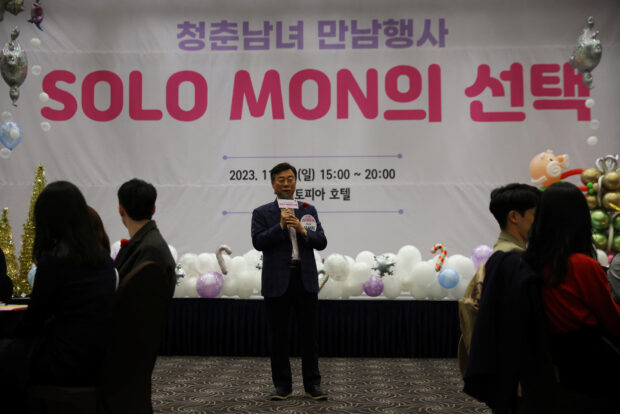
Seongnam Mayor Shin Sang-jin speaks during a mass blind date event in Seongnam, South Korea, November 19, 2023. REUTERS/Kim Hong-Ji
SEONGNAM, South Korea — Against the backdrop of Christmas songs, 100 South Korean men and women gathered at a hotel near Seoul dressed in their best with name tags hanging on their clothes, hoping to find love.
The government hopes they make babies.
They were participants at a mass blind-dating event hosted by Seongnam city, an attempt by the local government to reverse a falling birth rate in a country where the popularity of marriage and enthusiasm towards parenthood have nosedived.
The participants, in their 20s and 30s, sat quietly next to one another until a relationship coach kick started the event with a rock-paper-scissor game, quickly filling the room with chatter and laughter.
The city appeared determined to arrange a match, preparing red wine, chocolates, games, free make-up services, and even background checks for the participating singles.
Lee Yu-mi, 36, who works for the city government, said she had to apply three times to finally get a spot at the event.
“I had no idea it would be this competitive,” she said.
After five rounds of events this year, 198 people among 460 left the event as “couples,” agreeing to exchange contacts with their pairs, the city said.
The South Korean capital Seoul had considered a similar event but put the plan on hold after facing criticism that it would be a waste of taxpayers’ money that failed to tackle the reasons behind people opting not to marry and have babies – most notably the sky-high costs of housing and education.
Hwang Da-bin, who took part in a September event, said it saved him the cost of joining other social events or signing up for professional dating agencies.
“We are facing a real demographic crisis and the government needs to do whatever it can. I don’t understand people complaining over this,” Hwang said.
South Korea’s fertility rate dropped to a record low of 0.78 last year in yet another grim milestone for the country with the world’s lowest number of expected children for each woman.
The number is far below 1.66 in the United States and 1.3 in Japan in 2021. The average rate among countries in the Organisation for Economic Co-Operation and Development stood at 1.58 the same year.
Jung Jae-hoon, a professor at the department of social welfare at Seoul Women’s University, said it was “nonsense” to expect these events to lead to higher birth rates.
“You need to spend more money directly on supporting pregnancy, child delivery and parenting to call it a policy to boost birth rates,” Jung said.
Despite criticism, thousands of people have signed up for this year’s blind-dating events arranged by the Seongnam city.
Seongnam Mayor Shin Sang-jin said spreading positive views on marriage would eventually help raise the birth rates, stressing that the blind-dating events are just one of many policies his city has rolled out to reverse the plunging rates.
“Low birth rates cannot be resolved with a single policy,” Shin said. “It’s also the city’s job to create the environment for people who want to marry find their partners.”
($1=1,294.35 won)
RELATED STORIES